Running a small business in today’s digital world almost always requires a website. A professional website helps attract customers, build trust, and increase sales. But one of the first challenges many small business owners face is choosing affordable website hosting. Since budgets are often tight, finding the cheapest website hosting without sacrificing performance or reliability becomes very important.
In this guide, we will explore the cheapest website hosting options for small businesses. We’ll also cover two popular Cheap Website Hosting Providers—Hostinger and CrocWeb—that are known for their low prices and reliable services. By the end, you will have a clear idea of what hosting fits your needs and budget.
Why Small Businesses Need Website Hosting?
Before comparing providers, it’s important to understand what website hosting actually does. Hosting is the service that stores your website’s files and makes them available online. Without hosting, your website cannot be seen on the internet.
For small businesses, good hosting is essential because:
- It keeps your website available 24/7.
- A fast website improves customer experience and sales.
- Hosting provides email accounts (example: [email protected]).
- It ensures security with SSL certificates and backups.
Affordable hosting allows small businesses to build a strong online presence without spending too much money.
Key Factors When Choosing Cheap Hosting
Not all cheap hosting is good hosting. When searching for the best low-cost hosting for small businesses, look at:
- Price vs Value – The cheapest option is not always the best if it lacks important features.
- Reliability – Uptime should be at least 99.9%.
- Speed – A slow website can turn visitors away.
- Customer Support – 24/7 support is crucial for small businesses without tech staff.
- Scalability – Your hosting should grow with your business needs.
Comparison: Cheapest Small Business Web Hosting
- Hostinger – Lowest entry cost, great for beginners.
- CrocWeb – Affordable with free backups and eco-friendly hosting.
- DreamHost – Unlimited storage, transparent pricing.
- GThost – Flexible daily billing, great for short-term needs.
- Xcloud – Budget cloud hosting, scalable.
- Cloudways – Managed cloud hosting with pay-as-you-go.
- WPEngine – Premium WordPress hosting with expert support.
- Kinsta – Cloud-based premium hosting for growing WordPress sites.
- SiteGround – Affordable premium hosting with reliable support.
Hostinger: One of the Cheapest Hosting Providers with Premium Features
Hostinger is one of the most popular hosting companies worldwide, known for its extremely low prices and good performance. Many small businesses choose Hostinger because it combines affordability with features usually found in more expensive plans.
Key Features of Hostinger
- Low Prices: Hosting starts at just a few dollars per month, making it one of the cheapest options available.
- 99.9% Uptime Guarantee: Ensures your business website stays online.
- Free SSL Certificate: Important for building customer trust and securing transactions.
- User-Friendly hPanel: An easy-to-use control panel even for beginners.
- 24/7 Support: Available through live chat.
- Global Data Centers: Improves website speed for international visitors.

Why Small Businesses Choose Hostinger?
Small business owners often have limited technical knowledge. Hostinger makes it easy to set up a website with its one-click installer and beginner-friendly tools. For example, WordPress installation takes only minutes.
Another advantage is scalability. If your business grows, you can easily upgrade from shared hosting to cloud or VPS hosting without migrating to another provider.
CrocWeb: Budget-Friendly Canadian Hosting with High Performance
CrocWeb is another budget-friendly hosting provider, based in Canada. CrocWeb, a lesser-known but powerful option, offers cloud-based shared hosting starting at $2.95/month, with discounts for longer billing cycles. Based in Canada, it leverages LiteSpeed servers for superior speed and includes unlimited SSD storage, unmetered bandwidth, and free SSL certificates.
CrocWeb’s plans come with automated server failover and daily backups, ensuring maximum uptime and data security—crucial for small businesses reliant on consistent online availability. Its cPanel interface is user-friendly, and 24/7 expert support caters to beginners. CrocWeb is an excellent choice for cost-conscious owners seeking high-performance hosting with a focus on reliability, particularly for North American audiences.
Key Features of CrocWeb
- Affordable Pricing: Shared hosting starts at very low monthly rates.
- LiteSpeed Technology: Provides faster website performance compared to traditional hosting.
- Free SSL Certificates: Secure your website at no extra cost.
- cPanel Control Panel: Industry-standard interface for managing hosting.
- 99.9% Uptime Guarantee: Keeps your website online.
- Free Daily Backups: Protects your business website data.
- Eco-Friendly Hosting: Runs on green energy solutions.

Why Small Businesses Choose CrocWeb?
CrocWeb is ideal for businesses in Canada or North America that want fast speeds and local support. Its LiteSpeed server technology ensures websites load quickly, which is critical for keeping customers engaged.
Additionally, the fact that CrocWeb includes daily backups for free is a big advantage for small businesses. Data loss can be very costly, so having automatic backups gives peace of mind.
Hostinger vs CrocWeb: Which is Cheaper?
Both Cheap Website Hosting Services are affordable, but there are differences:
- Hostinger usually has lower promotional prices, making it one of the cheapest options globally. However, renewal prices can be higher.
- CrocWeb is slightly more expensive than Hostinger’s entry-level plans but includes features like daily backups and LiteSpeed servers that Hostinger charges extra for.
In short:
- If your priority is the lowest initial cost, choose Hostinger, the cheapest small Bbusiness web hosting.
- If you want affordable hosting with extra reliability and backups included, CrocWeb is a great choice.
Note: Our site is hosted with CrocWeb, ensuring quality and performance.
DreamHost: Reliable and Affordable Web Hosting for Small Businesses
DreamHost offers shared hosting starting at $2.59/month (36-month term), with transparent pricing and a generous 97-day money-back guarantee—one of the longest in the industry. The Shared Starter plan includes unlimited traffic, a free domain, free SSL, and WordPress pre-installed, supporting one website with ample scalability.
DreamHost’s custom control panel is intuitive, and its commitment to privacy and open-source technology appeals to security-conscious businesses. With reliable uptime and 24/7 support, DreamHost is a solid choice for small businesses seeking flexibility and a risk-free trial to test their online presence.
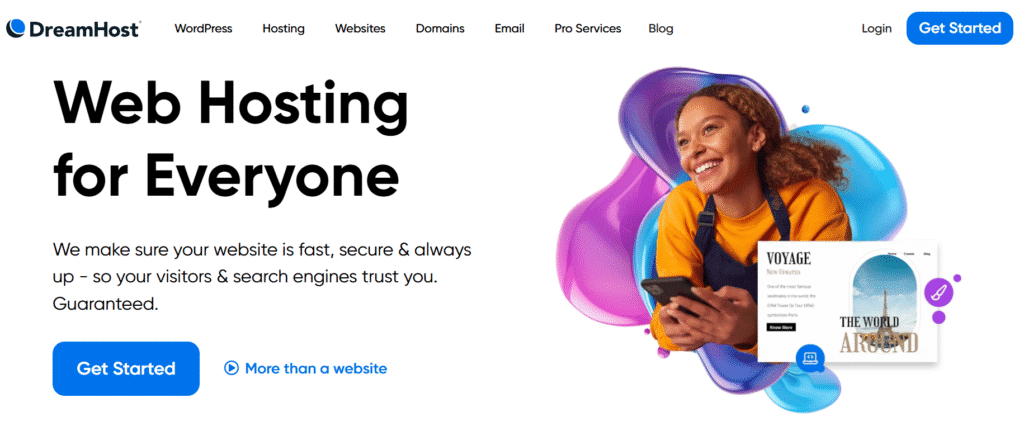
Key Features of DreamHost
- Shared hosting plans starting at low monthly rates.
- Unlimited bandwidth and storage on most plans.
- Free SSL and free domain included with yearly plans.
- 97-day money-back guarantee, one of the longest in the industry.
- WordPress recommended host for over 10 years.
Best for: Affordable Web Hosting for Small Businesses that want simple pricing, long refund protection, and unlimited resources.
GThost: Pay-Per-Day VPS Hosting
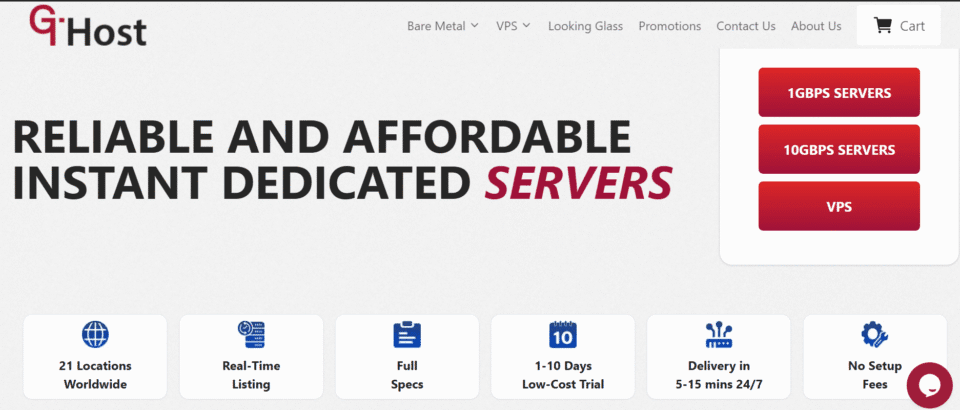
GThost is different from most providers because it offers daily billing instead of monthly or yearly subscriptions. GThost specializes in budget-friendly dedicated and VPS hosting, with instant dedicated servers starting at $5/month for daily billing or $59/month for unmetered plans, ideal for businesses needing more control than shared hosting offers.
Based in 17 global data centers, GThost provides SSD storage, unlimited bandwidth, and root access for customization, with no setup fees and instant server activation. Its plans include DDoS protection and 24/7 support, making it a cost-effective choice for small businesses with technical needs, such as developers or e-commerce sites requiring dedicated resources for performance.
Key Features of GThost
- Daily pricing model (pay only for what you use).
- Multiple data center locations worldwide.
- Instant server setup for quick deployment.
- Offers dedicated servers at budget-friendly rates.
- Suitable for businesses that need short-term hosting solutions.
Best for: Startups or small businesses that want flexible, pay-as-you-go hosting without contracts.
Xcloud: Affordable Cloud Hosting
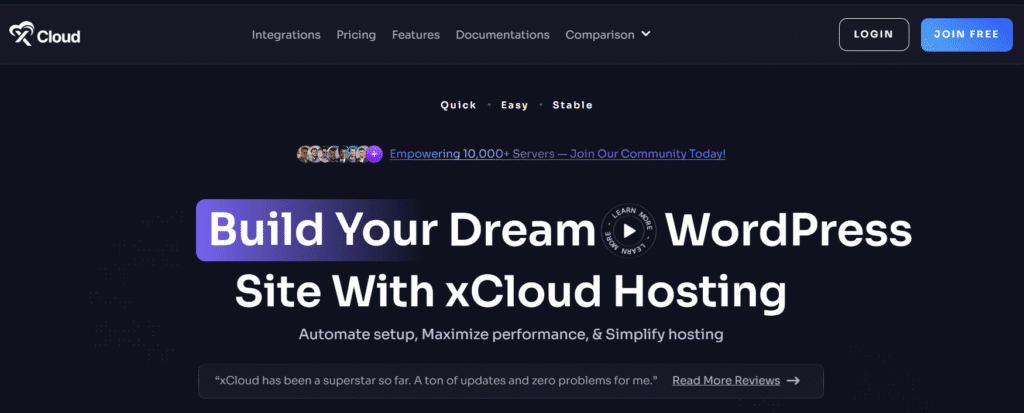
Xcloud, an emerging player, offers cloud hosting starting at approximately $4/month for entry-level plans, providing a scalable alternative to traditional shared hosting. With features like NVMe SSD storage, unlimited bandwidth, and a free SSL certificate, Xcloud ensures fast performance and security. Its pay-as-you-go model allows businesses to adjust resources dynamically, avoiding overpayment for unused capacity.
Xcloud’s user-friendly dashboard and 24/7 support make it suitable for small businesses seeking cloud-based flexibility, though pricing may vary based on resource usage, making it slightly less predictable than fixed-rate plans.
Key Features of Xcloud
- Cloud infrastructure for higher uptime.
- Flexible plans to match different business sizes.
- SSD storage for faster performance.
- Easy scaling as your website traffic grows.
- Competitive entry-level pricing.
Best for: Small businesses looking for affordable cloud hosting with room to grow.
Cloudways: Managed Cloud Hosting
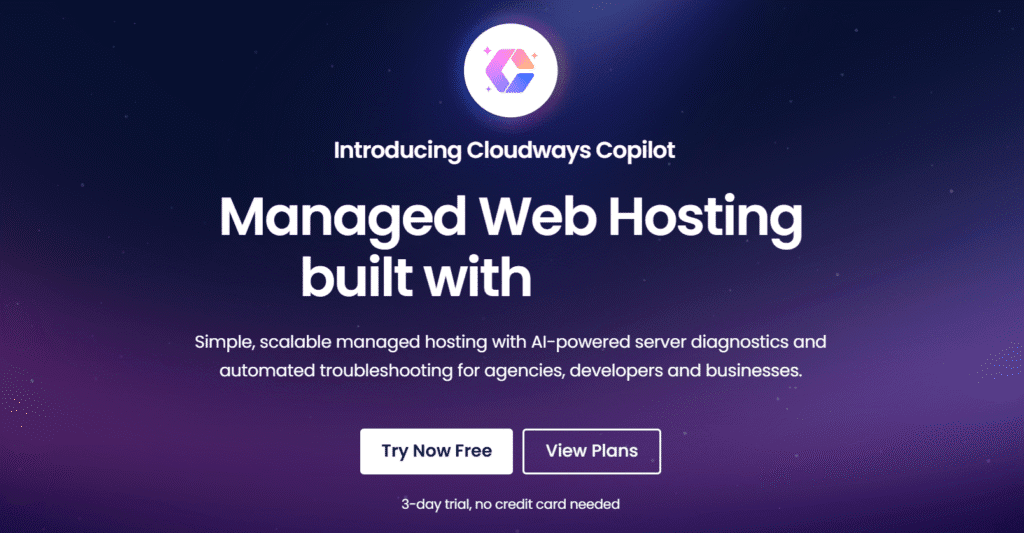
Cloudways delivers managed cloud hosting starting at $11/month for its DigitalOcean-based plan, offering a balance of affordability and premium performance. It supports hosting on top cloud providers like AWS, Google Cloud, and DigitalOcean, with features like SSD storage, auto-healing servers, and free SSL certificates.
Cloudways handles server management, backups, and security patches, freeing small business owners to focus on growth. Its pay-as-you-go pricing and one-click WordPress installation make it ideal for businesses prioritizing ease and scalability, though costs can rise with premium cloud providers like AWS ($20.56/month).
Key Features of Cloudways
- Choice of cloud providers (DigitalOcean, AWS, Google Cloud, etc.).
- Pay-as-you-go pricing for flexibility.
- Managed hosting with updates and security included.
- 24/7 support and monitoring.
- Advanced caching and CDN for faster performance.
Best for: Small businesses that want managed cloud hosting without needing technical skills.
WPEngine: Premium Managed WordPress Hosting
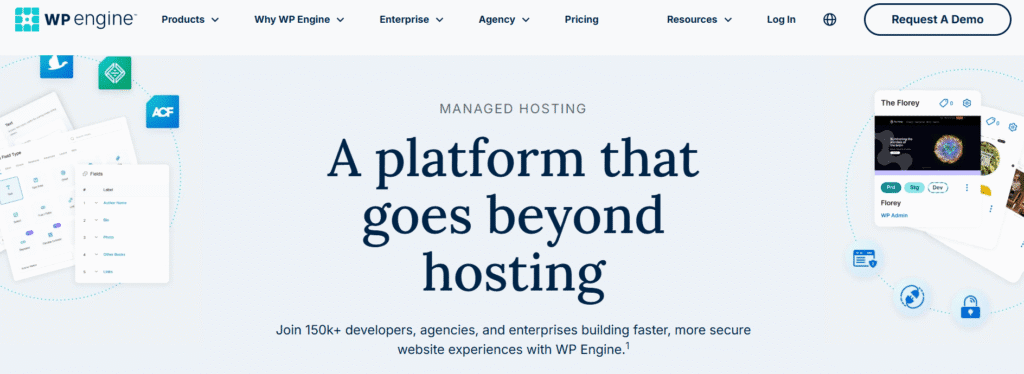
WP Engine specializes in managed WordPress hosting, with its Startup plan starting at $20/month (or $13/month when billed annually with discounts). While pricier than shared hosting, it offers 10 GB of storage, 50 GB of bandwidth, and free SSL, optimized for WordPress performance. Features like automated updates, daily backups, and a staging environment ensure seamless site management, while EverCache technology boosts speed.
With 24/7 support and a 60-day money-back guarantee, WP Engine is ideal for small businesses prioritizing WordPress reliability, though it’s less budget-friendly than others for non-WordPress needs.
- Fully managed WordPress hosting.
- High-level security with automatic updates.
- Daily backups included.
- 24/7 customer support by WordPress experts.
- Advanced caching for fast websites.
Best for: Small businesses that rely heavily on WordPress and want premium managed hosting.
Kinsta: Cloud-Powered WordPress Hosting

Kinsta is another premium host powered by Google Cloud infrastructure. Kinsta, another managed WordPress hosting provider, starts at $30/month (or $24/month annually) for its Starter plan, offering 10 GB of SSD storage, 25,000 monthly visits, and free SSL. Built on Google Cloud’s premium tier, Kinsta delivers exceptional speed and scalability, with features like automatic daily backups, staging environments, and a custom dashboard (MyKinsta).
Its 24/7 expert support is WordPress-focused, making it perfect for businesses with dynamic WordPress sites. However, Kinsta’s higher starting price makes it less ideal for budget-conscious startups compared to Hostinger or IONOS.
- Google Cloud servers for speed and stability.
- Automatic scaling to handle traffic spikes.
- Free SSL and CDN integration.
- Daily backups and strong security.
- User-friendly MyKinsta dashboard.
Best for: Growing small businesses that want cloud-powered WordPress hosting with premium features.
SiteGround: Affordable Premium Hosting
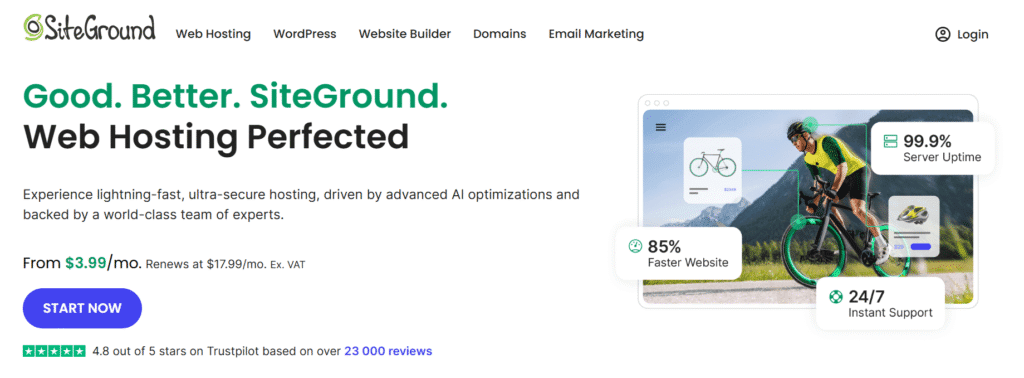
SiteGround offers shared hosting starting at $3.99/month (12-month term) for its StartUp plan, including 10 GB of SSD storage, unmetered traffic, and a free SSL certificate. Powered by Google Cloud infrastructure, it ensures excellent uptime and speed, with WordPress optimizations like SuperCacher and a one-click installer. SiteGround’s 24/7 support via chat, email, or phone is highly responsive, and daily backups add security. With a 30-day money-back guarantee, SiteGround is a great choice for small businesses valuing reliability and support over rock-bottom pricing.
- Excellent customer support, available 24/7.
- Free SSL and daily backups.
- Optimized for WordPress speed and performance.
- 99.99% uptime guarantee.
- Transparent pricing with good long-term value.
Best for: Small businesses that want affordable yet premium-quality hosting with outstanding support.
IONOS: Ultra-Low Introductory Pricing for Startups
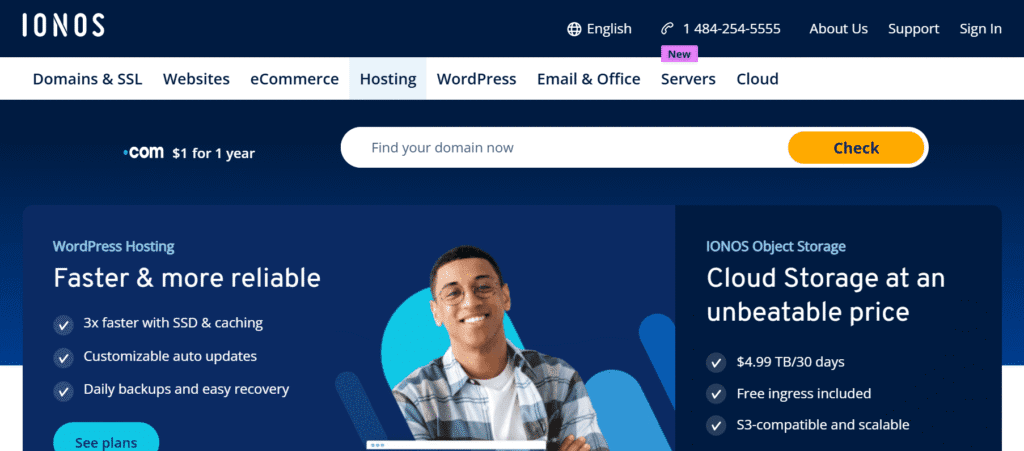
IONOS by 1&1 stands out with its rock-bottom introductory pricing, starting at $1/month for the first year on its Essential plan, scaling to $4/month upon renewal. This plan includes 10 GB of storage, unlimited bandwidth, a free domain, and a free SSL certificate, making it a budget-friendly option for new startups. IONOS offers scalable plans with strong security features like DDoS protection and daily backups, plus a website builder for quick launches. Its performance is enhanced by cloud-based infrastructure, and 24/7 support ensures reliability. IONOS is best for businesses seeking the lowest entry point with plans to upgrade as they grow.
Bluehost: WordPress-Optimized for Beginners
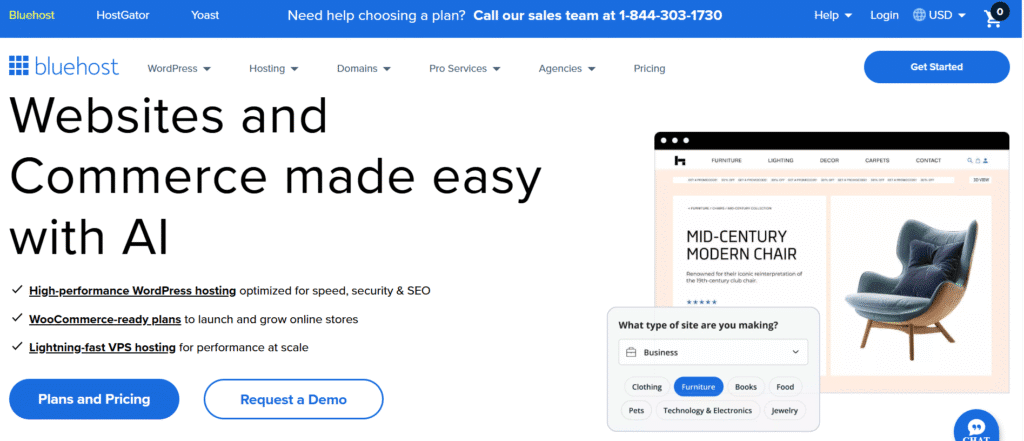
Bluehost, endorsed by WordPress, offers shared hosting starting at $2.95/month (36-month term), perfect for small businesses building WordPress sites. The Basic plan includes 50 GB of SSD storage, a free domain for the first year, free SSL, and unmetered bandwidth, with an intuitive dashboard for easy management. Bluehost’s drag-and-drop builder and AI tools simplify site creation, while 24/7 support ensures quick issue resolution. With a 30-day money-back guarantee and strong uptime, Bluehost suits businesses prioritizing WordPress integration, though renewal rates may increase post-promotion.
Comparison of best cheap web hosting for small business websites
The following table compares the cheapest hosting plans from top providers suitable for small businesses, focusing on pricing, key features, and ideal use cases. All prices reflect introductory rates for shared or entry-level plans, typically requiring a 12–48-month commitment, with renewals often higher. This comparison includes Hostinger, CrocWeb, WP Engine, Kinsta, SiteGround, DreamHost, GThost, Xcloud, Cloudways, Bluehost, and IONOS, based on their affordability, performance, and suitability for small business needs in 2025.
| Provider | Plan Name | Starting Price (Monthly) | Storage | Bandwidth | Free Domain | Free SSL | Key Features | Ideal For |
|---|---|---|---|---|---|---|---|---|
| Hostinger | Single Shared Hosting | $2.49 (48-month term) | 100 GB SSD | Unmetered | Yes (1st year) | Yes | LiteSpeed servers, hPanel, AI tools, website builder, 24/7 support, 30-day refund | Startups, budget-conscious businesses scaling fast |
| CrocWeb | Cloud Hosting | $2.95 (12-month term) | Unlimited SSD | Unmetered | No | Yes | LiteSpeed servers, cPanel, automated failover, daily backups, 24/7 support | North American businesses needing performance |
| WP Engine | Startup | $13.00 (annual billing) | 10 GB SSD | 50 GB | No | Yes | Managed WordPress, EverCache, staging, daily backups, 24/7 support, 60-day refund | WordPress sites prioritizing reliability |
| Kinsta | Starter | $24.00 (annual billing) | 10 GB SSD | 25,000 visits | No | Yes | Google Cloud, MyKinsta dashboard, staging, daily backups, 24/7 WordPress support | Dynamic WordPress sites needing premium speed |
| SiteGround | StartUp | $3.99 (12-month term) | 10 GB SSD | Unmetered | No | Yes | Google Cloud, SuperCacher, WordPress installer, daily backups, 24/7 support | Businesses valuing support and reliability |
| DreamHost | Shared Starter | $2.59 (36-month term) | Unlimited SSD | Unlimited | Yes (1st year) | Yes | Custom panel, WordPress pre-installed, privacy-focused, 24/7 support, 97-day refund | Businesses seeking flexibility, risk-free trial |
| GThost | Instant Dedicated | $5.00 (daily billing) | 40 GB SSD | Unmetered | No | Yes | 17 global data centers, root access, DDoS protection, instant setup, 24/7 support | Technical users, e-commerce needing dedicated resources |
| Xcloud | Entry Cloud | ~$4.00 (variable) | NVMe SSD (varies) | Unmetered | No | Yes | Pay-as-you-go, scalable resources, NVMe SSD, user-friendly dashboard, 24/7 support | Businesses needing flexible cloud hosting |
| Cloudways | DigitalOcean Basic | $11.00 (pay-as-you-go) | 25 GB SSD | 1 TB | No | Yes | Managed cloud, auto-healing servers, one-click WordPress, 24/7 support | Businesses prioritizing managed cloud scalability |
| Bluehost | Basic | $2.95 (36-month term) | 50 GB SSD | Unmetered | Yes (1st year) | Yes | WordPress-recommended, drag-and-drop builder, AI tools, 24/7 support, 30-day refund | WordPress beginners, small businesses |
| IONOS | Essential | $1.00 (12-month term) | 10 GB | Unlimited | Yes (1st year) | Yes | DDoS protection, daily backups, website builder, cloud-based, 24/7 support | Startups seeking lowest entry cost |
Notes:
- Pricing: Introductory rates are shown; renewals may be higher (e.g., IONOS renews at $4/month, Bluehost at ~$9.99/month). Annual or multi-year billing often required for lowest rates.
- Storage/Bandwidth: SSD storage ensures faster load times; unmetered bandwidth suits growing traffic but may have fair-use limits.
- Free Domain/SSL: Free domains (typically for the first year) save $10–$15 annually; SSL certificates are standard for security.
- Use Case: WP Engine and Kinsta are premium for managed WordPress, while Hostinger, Bluehost, and IONOS offer the lowest shared hosting prices. GThost and Cloudways cater to technical or scalable needs.
- Sources: Pricing and features are based on web data from 2025, including futurescope.co and simplymac.com. Always verify current rates on provider websites, as promotions vary.
This table helps small businesses compare affordable hosting options to find the best fit for their budget, performance needs, and growth goals in 2025.
Selecting the Right Hosting for Your Business
Choosing the best web hosting for small business websites depends on your business’s needs. Hostinger offers the best overall value with low pricing and robust features for startups. CrocWeb and GThost provide high-performance options for North American and technical users. WP Engine and Kinsta cater to WordPress users seeking managed solutions, while SiteGround balances reliability and support. DreamHost’s long trial ensures flexibility, Xcloud and Cloudways offer scalable cloud hosting, Bluehost suits WordPress beginners, and IONOS provides the lowest entry point. Compare long-term costs, as promotional rates often rise, and align the provider with your growth goals to ensure your small business thrives online in 2025.
Which Features Do I Need for Small Business Web Hosting?
For any small business owner looking to establish a strong online presence, choosing the right web hosting is one of the most important decisions. A website is often the first impression potential customers get of your brand, and the hosting you choose directly impacts its speed, security, and overall performance. But with so many providers and plans available, it can be overwhelming to know which features are truly necessary. This guide will break down the essential web hosting features small businesses need to ensure their websites run smoothly, securely, and effectively.
1. Reliable Uptime Guarantee
The first feature to look for in a hosting plan is uptime reliability. Uptime refers to the amount of time your website is accessible to visitors. Most reputable providers guarantee at least 99.9% uptime, meaning your site will rarely go offline. For small businesses, downtime can lead to lost sales, missed leads, and a damaged reputation. Always check the hosting provider’s uptime history and service level agreement (SLA) before committing.
2. Fast Loading Speed
In today’s digital landscape, speed is everything. Research shows that 40% of users abandon a website if it takes more than 3 seconds to load. Search engines like Google also use website speed as a ranking factor. A good hosting plan should include features like SSD storage, content delivery networks (CDN), and optimized server performance. For small businesses, fast websites mean happier visitors, more conversions, and stronger SEO rankings.
3. Security Features
Small businesses are not immune to cyberattacks. In fact, they are often prime targets because hackers assume smaller companies have weaker defenses. Essential security features include:
- SSL Certificates: Encrypts data and secures transactions, building customer trust.
- Firewalls & Malware Protection: Defends your site from hacking attempts.
- Automated Backups: Ensures you can restore your website quickly if data is lost.
- DDoS Protection: Shields against traffic overload attacks that can crash your site.
A secure hosting environment not only protects your business but also reassures customers that their data is safe.
4. Scalability and Flexibility
Your business may start small, but it’s important to think ahead. A good web hosting plan should allow you to easily upgrade resources as your business grows. Features like scalable storage, bandwidth, and support for multiple websites are crucial. Starting with a shared hosting plan is common for small businesses, but having the ability to upgrade to VPS or dedicated hosting ensures your website won’t outgrow its capabilities.
5. User-Friendly Control Panel
Managing your website should not require advanced technical skills. That’s why a user-friendly control panel (like cPanel or Plesk) is essential. A control panel lets you manage domains, emails, databases, and files with ease. Many hosting providers also offer one-click installations for popular platforms like WordPress, making it simple to set up your site without coding knowledge.
6. Email Hosting
A professional business email address (e.g., [email protected]) builds credibility and helps strengthen your brand image. Many hosting providers include email hosting features with their plans, such as spam filters, webmail access, and integration with tools like Microsoft Outlook or Google Workspace. Having business email tied to your domain looks more trustworthy than using a free Gmail or Yahoo account.
7. Customer Support Availability
Technical issues can arise at any time, and for a small business, downtime means lost opportunities. That’s why 24/7 customer support is a must-have hosting feature. Look for providers that offer multiple support channels, such as live chat, phone, and email. Reading customer reviews can help you gauge the responsiveness and helpfulness of a host’s support team.
8. Storage and Bandwidth
The amount of storage and bandwidth you need depends on the type of website you run. A small local business website with a few pages may only require a small amount of storage, while an e-commerce store with hundreds of product images will need much more. Make sure your hosting plan includes ample SSD storage and unmetered bandwidth to handle your website’s traffic without performance issues.
9. Backup and Restore Options
Losing website data can be devastating for a business. Accidental deletions, server crashes, or malware infections can wipe out your hard work. That’s why automatic daily or weekly backups are a critical hosting feature. Equally important is the ability to restore your site easily with one click. Having reliable backup options provides peace of mind that your website can recover quickly if something goes wrong.
10. Integration with CMS and E-commerce Platforms
Many small businesses use content management systems (CMS) like WordPress, Joomla, or Drupal. If you’re planning to sell products online, you may also need e-commerce compatibility with WooCommerce, Shopify, or Magento. Ensure your hosting provider supports these platforms and offers one-click installation for convenience. Choosing a host optimized for WordPress or e-commerce ensures your site performs efficiently.
11. Cost-Effectiveness and Value
Budget is always a consideration for small businesses. While it may be tempting to go with the cheapest hosting provider, low-cost plans often come with limitations like slow performance, poor support, and hidden fees. Instead, look for affordable hosting plans that balance cost with quality features. Many reputable hosts offer entry-level packages with the ability to scale up later, making them perfect for small businesses.
Frequently Asked Questions (FAQ)
Are Cheap Web Hosting Services Reliable?
Cheap web hosting services can be reliable, but it largely depends on the provider. Many budget hosts offer stable uptime, essential features, and customer support suitable for small websites or startups. However, cheaper plans often come with limitations like slower performance, fewer resources, or less security. For personal blogs or small business sites, they can be a good starting point, but for scalability, high traffic, or advanced features, investing in a reputable mid-tier hosting plan is usually wiser.
What are the Disadvantages of Cheap Web Hosting?
The disadvantages of cheap web hosting include limited server resources, slower website performance, and frequent downtime risks. These plans often lack advanced security features, making sites more vulnerable to cyberattacks. Customer support may also be slower or less effective compared to premium hosting. Additionally, cheap hosting can struggle to handle high traffic, causing scalability issues. While affordable, these drawbacks may affect website reliability, speed, and long-term growth, making it less ideal for businesses needing strong online performance.
Which hosting is best for a small business website?
The best hosting depends on your needs. If you want the cheapest option, Hostinger and CrocWeb are great choices. If you prefer managed WordPress hosting, then SiteGround, WPEngine, or Kinsta are better. For businesses that expect growth, Cloudways provides scalable cloud hosting.
Is shared hosting good for small businesses?
Yes, shared hosting is often the most affordable option for small businesses just starting out. It’s budget-friendly and includes features like free SSL and emails. However, if your site grows quickly or requires higher performance, you may need to upgrade to cloud hosting or managed hosting.
What is the cheapest website hosting service?
Currently, Hostinger is one of the cheapest hosting providers, with plans starting at just a few dollars per month. DreamHost also offers low-cost unlimited hosting with a long money-back guarantee.
Should I choose managed hosting for my small business?
Managed hosting (like WPEngine, Kinsta, or SiteGround) is worth it if you run a WordPress website and don’t want to handle technical updates, backups, and security. It costs more, but it saves time and reduces risks.
What hosting is best for eCommerce small businesses?
For eCommerce websites, speed and security are very important. Cloudways, SiteGround, and Kinsta are excellent choices. They offer fast loading times, SSL certificates, and scalability for handling online store traffic.
How do I save money on hosting?
You can save money on hosting by:
- Signing up for long-term plans (1–3 years).
- Using promotions and coupons.
- Starting with shared hosting and upgrading later.
- Comparing renewal rates before committing.
Is free website hosting good for small business?
Free hosting is not recommended for small businesses. It often comes with ads, limited bandwidth, and no security. Paid hosting (even the cheapest ones) offers SSL certificates, backups, and professional support—making your business more trustworthy.
Which hosting provider offers the best support for small businesses?
SiteGround is well-known for its outstanding customer support. WPEngine and Kinsta also provide expert WordPress support. If budget is your priority, Hostinger offers 24/7 live chat support at a low cost.
Can I upgrade hosting later as my business grows?
Yes! Most hosting providers allow you to start with a small plan and upgrade to bigger ones as your business grows. Cloudways, Kinsta, and SiteGround are especially good at providing easy scaling options.
What’s better: cloud hosting or shared hosting for small businesses?
- Shared hosting is cheaper and great for new businesses.
- Cloud hosting (like Cloudways or Xcloud) is slightly more expensive but offers better speed, scalability, and uptime. If you expect growth, cloud hosting may be the smarter long-term choice.








